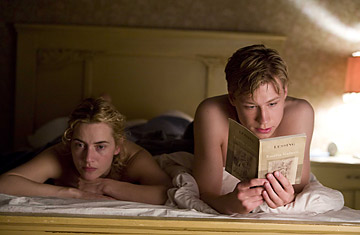
Kate Winslet, left, and David Kross in The Reader
Bernhard Schlink's The Reader is one of those tricky novels that, based on the sober moral questions it poses and its close-to-elegant style, pretends to high literary seriousness while offering its readers — millions upon millions of them in the 37 countries where it has been translated — plenty of lubriciously rendered romps in the hay with a woman in her mid-30s and an eager young man in his mid-teens. Stephen Daldry's film, written by David Hare, is faithful both to the novel's plot and to its higher aspirations. This is not an entirely good thing. On the other hand — and somewhat surprisingly — it is not an entirely bad thing.
Even if you have not read the book, you're probably familiar with the plot. A 15-year-old lad named Michael Berg (David Kross, giving a splendidly modulated performance of teen angst, sexuality and intellectual aspiration) falls ill in the entrance of an apartment building in 1950s Germany. He is rescued by an attractive working-class woman named Hanna (Kate Winslet in a performance that heartbreakingly combines passivity and anger) who arranges his return home. When he comes back to thank her for her aid, they embark upon a heated sexual relationship, which, in due course, she abruptly breaks off. Some years later, as a law student, he visits a courtroom where he finds her on trial as a war criminal, which shocks him beyond measure. He also — quite belatedly — discovers that she is illiterate and that her shame at that condition probably, in some way that is not clear to us (or her), contributed to her wartime depredations against Jewish women she was transporting on a death march. Still later (and now played by Ralph Fiennes), Michael supplies her with the books she painfully learns to read during her imprisonment, though he otherwise keeps her at a wary distance. Eventually, she comes to a sad and not entirely predictable ending. (See the top 10 movie performances of 2008, including Winslet as Hanna.)
You do not need a Ph.D. in comparative literature to understand that Hanna's illiteracy symbolizes the willed ignorance of the German people about the genocide that was going on around them during World War II. Historically speaking, Germany was among the most literate nations and, also, one of the most morally conscientious ones — which is why Schlink's illiteracy conceit works so well. If you can read — whether it be a book or highly visible mass behavior — yet refuse to do so, then what might in another context be dismissed as no more than backwoods ignorance is transformed into a vast and palpable moral crime. I'm not certain that Schlink's novel or this film makes that connection explicit. Both have obligations to melodramatic plotting and characterization that to a degree blur the inherent point of the exercise. In the end, Hanna's defense of her crime — she allowed most of her prisoners to die in a fire in a church (hard to imagine a more obvious choice of crime scene) — comes down to, well, yes, what Hannah Arendt called the banality of evil.
I don't deny the validity of Arendt's subtle, brutal reading of what is surely the most terrible event in a modern history that continues to be rife with such horror. But it is an idea that has lost much of its power to arrest our attention in fictional narrative. In some of the early Internet commentaries on this film, people natter on about the effect on the boy of having sex with an older, presumably exploitative woman — as if that's the big moral issue being explored here. Well, it didn't bother Oprah, who selected The Reader for her book club, and it doesn't bother me. At 15, boys are supposed to be having sex — or at least trying to have it. And I don't see how it is necessarily more scarring to have it with an experienced older woman than it is to have awkward, fumbling encounters with someone just as innocent as you are. Yes, Fiennes' older Michael is an emotionally distant, even chilly figure. But it does not necessarily follow that that is a result of his adolescent sexual encounters.
In a curious way, though, much of this is superfluous to the movie as a movie. The story dares to hint at a certain smugness in the attitudes of its victims, which is something we are not at all used to in movies of this kind. And as a romance, at times feverish and at other times grim, the film works surprisingly well. There's something gripping about the relationship between this ill-assorted pair, and something touching about the way events beyond their control or understanding reach out to blight their lives.
